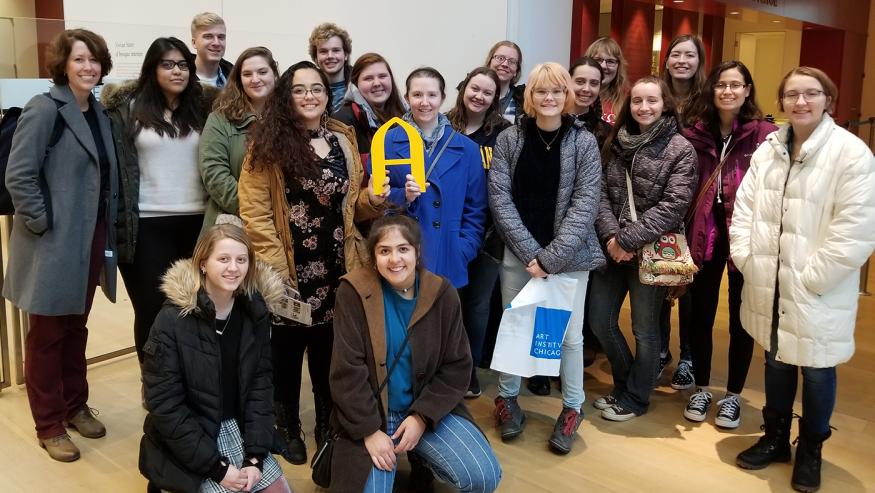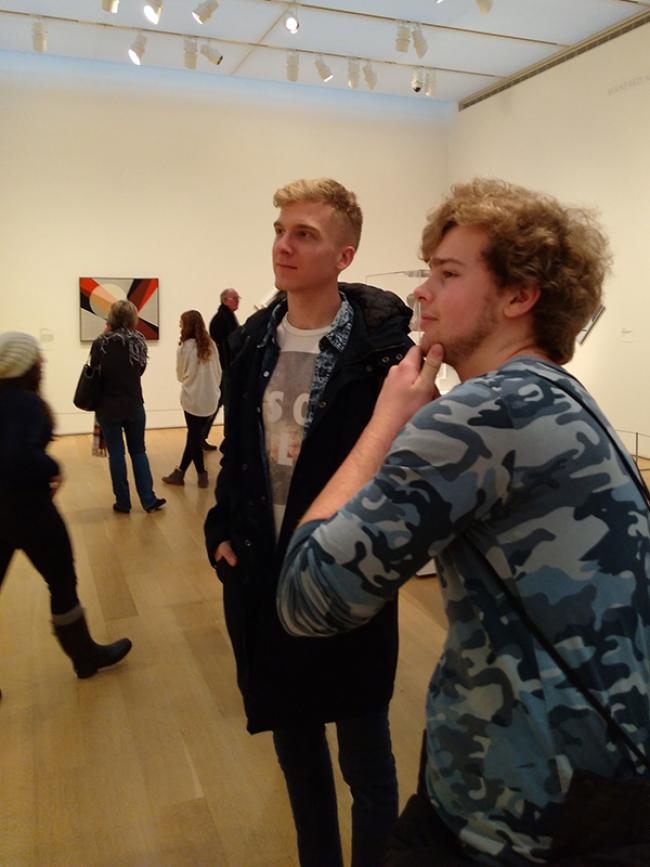
A writer goes ‘along for the adventure’
On a recent field trip with other creative writing and English majors, Jack Harris ’20 took notes on his experience. He works in the student Writers Bureau in Augustana’s Office of Communication and Marketing.
11:15 a.m. I peel my eyes open and am slightly shocked to find downtown Chicago rising around my bus window. My presence on this field trip almost never happened—emails can get buried in my Augie inbox, and I almost missed notification of one of the English and creative writing department’s field trips that Saturday morning. Billed as a half culture-appreciation, half bonding-with-your-fellow-writing-majors day, I had taken Tina Fey’s golden improv advice (always say yes) and signed myself up, not entirely sure of where we were headed or why, but excited to be along for the adventure. Such is the life of a writing major.
11:28 a.m. Our bus drops us off at at the American Writers Museum, and one elevator ride later, our group stands in the lobby listening to a short pitch on what’s in store. The museum is a tribute to America’s great writers, or as many of them as could fit, with the only solid and slightly macabre rule for inclusion in the ever-shifting exhibit being that featured writers must be dead (possibly to protect against authors like J.K. Rowling pulling a Cursed Child stunt).

The museum feels like a vast reading nook, with armchairs and real, physical books (no Kindles to be found here) scattered across the lobby area, which in turn is surrounded by a circle of interactive exhibits. I take off in a lap around the space, wandering through floor-to-ceiling banners reverently depicting great Chicago writers, printing my own poetry on real typewriters and hanging it on the wall, impressed at how philosophical strangers on the wall have gotten. Marveling at all the writers who have come before me, I start to feel a sense of legacy with those who have done successfully what I want to do.
12:47 p.m. In the rain-snow-sleet, we walk past The Bean (or Cloud Gate), the first time I’ve ever seen it in person. I’m immediately jokingly laughed at for my childlike wonder.
1:45 p.m. We’ve arrived at the Art Institute of Chicago and are given free rein for the next few hours. Standing in front of A Sunday Afternoon on the Island of La Grande Jatte, it strikes me that I am in the same spot as Cameron Fry Ferris Bueller’s Day Off, staring into the eyes of the creepy dot-child, and have a tiny moment of understanding between myself and the filmmakers who decided to write that scene in (though the fact that Cameron had the room to himself in the movie is ridiculous—I’m grateful, in that moment, that I stand around 6’3” in the crowd).
Walking around the exhibits, I recognize poetry in the paintings. Though these artists didn’t write, they still created, and that creation begets inspiration. I feel ideas for poems and stories blooming in the back of my head as I tour, and see the same in the eyes of my peers, and feel that I have inched closer to understanding why it is I want to write.
3:50 p.m. Once more braving the rain-snow-sleet, we pile onto the bus. Somebody decides to put on Hayao Miyazaki’s masterpiece Howl’s Moving Castle on the TV. As I watch, I’m struck by the interaction of beautiful art, animation, and writing, all informing and feeding the other.
“A heart’s a heavy burden,” one character says at the end of the film, and I smile a little, thinking of all the artists and writers whose hearts I had seen that day. A sense of connection washes over me on that dark bus with the lights of the city going by—it’s a little bit of hope that maybe I have something like all of this in me, too. Pursuing writing or English may sometimes feel paradoxically trivial and also a heavy burden, but it’s one I’ve been inspired to carry just a little longer.
“Queue”
I sleep better than I used to, maybe
because I’m better at being a
roommate to my own pulse—
I have learned what it likes, I
know its Netflix queue, and now
that we have brunch every
Wednesday, I can recognize its
profile in the dark and I can
greet it. The eternal throb in the bottom of my ribs
is a reminder:
I am not a memory.
Not yet.
